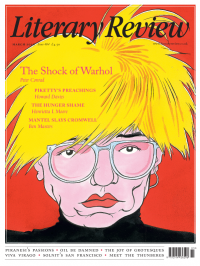Saul David
Conquer & Divide
Land of Tears: The Exploration and Exploitation of Equatorial Africa
By Robert Harms
Basic Books 537pp £30
The story of the so-called ‘Scramble for Africa’ – the period between roughly 1876 and 1912, when European nations added almost 10 million square miles of the continent and 110 million new subjects to their overseas colonial possessions – is well known to British readers. Less familiar is the tragic sequence of events at the heart of the process: the ruthless exploitation of the Congo River basin by Zanzibari traders, King Leopold II of Belgium and the French government.
A huge area roughly the size of the United States east of the Mississippi River, the Congo basin rainforest was characterised by its many languages, ethnic groups and distinctive ‘small-scale political units with flexible forms of leadership and authority’. But all this would change in the late 19th century as intruders arrived from both east and west. ‘From the East African coast’, writes Robert Harms, a professor of history and African studies at Yale, ‘came Arab and Swahili traders – subjects of the sultan of Zanzibar – in search of ivory and slaves. They were followed closely by British explorers looking for the source of the Nile, a quest that led Henry Morton Stanley to follow the Congo River downstream to the Atlantic Ocean in 1877.’ That same year, the Italian explorer Pierre Savorgnan de Brazza, with support from the government of France, entered the watershed of the Congo River from the west by traversing the Crystal Mountains.
It was the start of a brutal process of exploitation. Merchants
in search of ivory, captives, and rubber, who operated under the authority of the sultan of Zanzibar, the king of Belgium, or the government of France, entered the rainforest to strip it of its bounty. Ordinary people

Sign Up to our newsletter
Receive free articles, highlights from the archive, news, details of prizes, and much more.@Lit_Review
Follow Literary Review on Twitter
Twitter Feed
The era of dollar dominance might be coming to an end. But if not the dollar, which currency will be the backbone of the global economic system?
@HowardJDavies weighs up the alternatives.
Howard Davies - Greenbacks Down, First Editions Up
Howard Davies: Greenbacks Down, First Editions Up - Our Dollar, Your Problem: An Insider’s View of Seven Turbulent...
literaryreview.co.uk
Johannes Gutenberg cut corners at every turn when putting together his bible. How, then, did his creation achieve such renown?
@JosephHone_ investigates.
Joseph Hone - Start the Presses!
Joseph Hone: Start the Presses! - Johannes Gutenberg: A Biography in Books by Eric Marshall White
literaryreview.co.uk
Convinced of her own brilliance, Gertrude Stein wished to be ‘as popular as Gilbert and Sullivan’ and laboured tirelessly to ensure that her celebrity would outlive her.
@sophieolive examines the real Stein.
Sophie Oliver - The Once & Future Genius
Sophie Oliver: The Once & Future Genius - Gertrude Stein: An Afterlife by Francesca Wade
literaryreview.co.uk